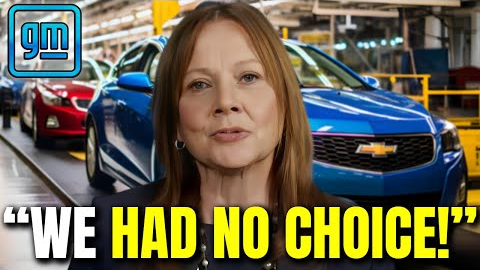HUGE NEWS! GM CEO Just SHUT DOWN All Dealers!
30,449 View
Share this Video
- Publish Date:
- December 13, 2023
- Category:
- Where to Buy
- Video License
- Standard License
- Imported From:
- Youtube
Tags

General Motors (GM) CEO Mary Barra announced a paradigm-shifting makeover for the corporation in a landmark revelation that has sent ripples throughout the automotive world. GM, known for classic brands such as Chevrolet, GMC, Cadillac, and Buick, is forging a new path, abandoning the traditional dealership model in favour of a direct-to-consumer strategy. This strategic shift has the potential to upend the existing quo and change the competitive environment, even taking on Tesla, Rivian, Lucid Motors, and NIO in the electric vehicle (EV) sector.
Mary Barra highlighted GM's vision for the future during a high-energy press conference in Detroit, the hub of American auto manufacturing, emphasising operational efficiency, cost reduction, and an improved customer experience. The choice to abandon dealerships in favour of online automobile sales demonstrates GM's dedication to innovation, sustainability, and staying ahead of competitors in the rapidly changing automotive sector.
The change from traditional dealerships to direct-to-customer sales is a seismic shift that corresponds to shifting consumer tastes. As more buyers choose online research and remote test drives, GM is gearing itself to meet these changing demands. This initiative follows in the footsteps of disruptors such as Tesla, which has already made waves with its direct sales model, upsetting established auto retail traditions.
However, GM's move to direct-to-consumer sales does not mean the death of dealerships. The company is committed to assisting its existing dealers with rebranding and training in order to help them transition into service centres or adapt to new responsibilities in the dynamic landscape. This collaborative approach sets GM apart from its competitors and guarantees a smoother transition for all parties.
In a fiercely competitive automotive sector, GM's move to go direct-to-consumer indicates a willingness to adapt to the digital age while remaining one of the industry's behemoths. Rivals such as Ford and Volkswagen are also experimenting with similar tactics, recognising the importance of meeting consumer expectations for fast online car purchasing experiences.
GM's customer-centric strategy aims to transform the industry by acquiring essential data on individual consumer preferences and behaviours. This data-driven strategy enables more personalised marketing efforts, which is a critical differentiation in an industry where consumer interactions are critical. In order to compete with its competitors, the company wants to offer services such as home delivery and video consultations with experts.
However, the impact on traditional dealerships raises serious concerns about their future position. While some may change their focus to service and maintenance, others may remain as partners to support GM's direct sales approach. The dealership environment will likely alter rather than disappear as the business evolves, offering a variety of services to consumers.
The environmental commitment of GM is equally important in this strategic pivot. The company hopes to reduce its carbon footprint and boost the use of electric and hybrid automobiles by eliminating the need for physical showrooms and embracing electrification. This is consistent with the overall industry trend towards sustainability, in which rivals and competitors are also making progress in the EV sector.
The capacity to establish a robust internet infrastructure, gain consumer trust, and negotiate regulatory difficulties is critical to the success of GM's direct-to-consumer approach. While the regulatory landscape may provide challenges in some areas, GM's determination to collaborate closely with lawmakers and authorities demonstrates its commitment to making this transition a reality.
The daring decision by General Motors to switch to a direct-to-consumer approach is a major changer in the automotive industry, altering how people buy automobiles and portraying the firm as a forward-thinking leader. The move puts rivals and competitors on the spot to adapt to the changing automotive landscape, while also offering consumers a more convenient, personalised, and environmentally responsible car-buying experience. Stay tuned as GM navigates this exciting shift, laying the groundwork for a vibrant and competitive automotive future. Subscribe to our channel for additional information on this game-changing news!
Did you miss our previous article...
https://trendinginrealestate.com/where-to-buy/clayton-morris-warns-is-a-us-housing-crash-coming-in-2024-morris-invest














